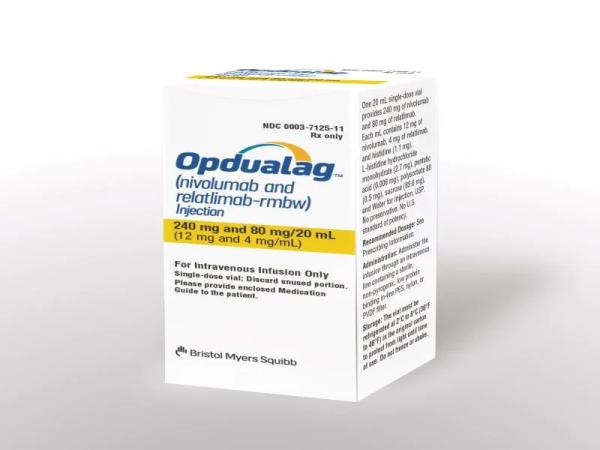Nivolumab / relatlimab Side Effects
Medically reviewed by Drugs.com. Last updated on Feb 4, 2024.
Applies to nivolumab / relatlimab: intravenous solution.
Serious side effects
Along with its needed effects, nivolumab/relatlimab may cause some unwanted effects. Although not all of these side effects may occur, if they do occur they may need medical attention.
Check with your doctor or nurse immediately if any of the following side effects occur while taking nivolumab / relatlimab:
More common
- Back pain
- black, tarry stools
- blistering, peeling, or loosening of the skin
- chest pain or tightness
- chills
- constipation
- cough
- dark urine
- depressed mood
- diarrhea
- dry skin and hair
- feeling cold
- fever
- flushing
- hair loss
- headache
- hoarseness or husky voice
- itching
- joint or muscle pain
- light-colored stools
- muscle cramps and stiffness
- nausea and vomiting
- nervousness
- painful or difficult urination
- red irritated eyes
- red skin lesions, often with a purple center
- sensitivity to heat
- slowed heartbeat
- sore throat
- sores, ulcers, or white spots in the mouth or on the lips
- stomach cramps, pain, or tenderness
- sweating
- swollen glands
- trouble breathing
- trouble sleeping
- unusual bleeding or bruising
- unusual tiredness and weakness
- upper right abdominal or stomach pain
- watery or bloody diarrhea
- weight loss or gain
- yellow eyes and skin
Less common
- Bloody or cloudy urine
- chest discomfort
- darkening of the skin
- decrease in urine output or decrease in urine-concentrating ability
- dizziness
- fainting
- fast heartbeat
- loss of appetite
- mental depression
- muscle spasms
- pain or discomfort in the arms, jaw, back or neck
- pale skin
- seeing flashes or sparks of light
- seeing floating spots before the eyes, or a veil or curtain appearing across part of vision
- skin rash
- swelling of the face, feet, or lower legs
- swelling or redness in the joints
- thickening of bronchial secretions
Rare
- Anxiety
- back, leg, or stomach pains
- bleeding gums
- bloating
- blue or pale skin
- blurred vision
- burning, tingling, numbness or pain in the hands, arms, feet, or legs
- burning feeling in the chest or stomach
- chest pain, possibly moving to the left arm, neck, or shoulder
- confusion
- difficulty in breathing, chewing, swallowing, or talking
- double vision
- drooping eyelids
- drowsiness
- dry mouth
- eye pain
- fruit-like breath odor
- heavier menstrual periods
- inability to move the arms and legs
- increased hunger
- increased thirst
- increased urination
- indigestion
- irritability
- loss of consciousness
- muscle weakness
- nosebleeds
- pains in the stomach, side, or abdomen, possibly radiating to the back
- pinpoint red spots on the skin
- redness, soreness, or itching skin
- redness of the eye
- seizures
- sensation of pins and needles
- sensitivity of the eyes to light
- stabbing pain
- stiff neck or back
- stomach upset
- sudden numbness and weakness in the arms and legs
- swollen, painful, or tender lymph glands in the neck, armpit, or groin
- tearing
Other side effects
Some side effects of nivolumab / relatlimab may occur that usually do not need medical attention. These side effects may go away during treatment as your body adjusts to the medicine. Also, your health care professional may be able to tell you about ways to prevent or reduce some of these side effects.
Check with your health care professional if any of the following side effects continue or are bothersome or if you have any questions about them:
More common
- Decreased appetite
For Healthcare Professionals
Applies to nivolumab / relatlimab: intravenous solution.
General
The most frequent (greater than 1%) serious adverse events reported in clinical trials were adrenal insufficiency, anemia, colitis, pneumonia, acute myocardial infarction, back pain, diarrhea, myocarditis, and pneumonitis. The most common (greater than 20%) adverse reactions were musculoskeletal pain, fatigue, rash, pruritus, and diarrhea.[Ref]
Cardiovascular
Frequency not reported: Myocarditis[Ref]
Dermatologic
Very common (10% or more): Rash (28%), pruritus (25%)
Frequency not reported: Vitiligo[Ref]
Endocrine
Very common (10% or more): Hypothyroidism (17%)
Frequency not reported: Adrenal insufficiency
Gastrointestinal
Very common (10% or more): Diarrhea (24%), nausea (17%)[Ref]
Hematologic
Very common (10% or more): Decreased hemoglobin (37%), decreased lymphocytes (32%)[Ref]
Hepatic
Very common (10% or more): Increased AST (30%), increased ALT (26%)
Frequency not reported: Hepatitis[Ref]
Metabolic
Very common (10% or more): Decreased appetite (15%), increased alkaline phosphatase (19%)[Ref]
Musculoskeletal
Very common (10% or more): Musculoskeletal pain (45%)[Ref]
Nervous system
Very common (10% or more): Headache (18%)[Ref]
Other
Very common (10% or more): Fatigue (39%), decreased sodium (24%)[Ref]
Renal
Very common (10% or more): Increased creatinine (19%)[Ref]
Respiratory
Very common (10% or more): Cough (15%)
Common (1% to 10%): Pneumonitis[Ref]
More about nivolumab / relatlimab
- Check interactions
- Compare alternatives
- Dosage information
- During pregnancy
- Drug class: antineoplastic combinations
- En español
Patient resources
Other brands
Professional resources
Other brands
Related treatment guides
References
1. Product Information. Opdualag (nivolumab-relatlimab). Bristol-Myers Squibb Australia Pty Ltd. 2023;2.
2. Product Information. Opdualag (nivolumab-relatlimab). Bristol-Myers Squibb. 2022.
Further information
Always consult your healthcare provider to ensure the information displayed on this page applies to your personal circumstances.
Some side effects may not be reported. You may report them to the FDA.

